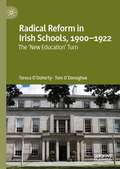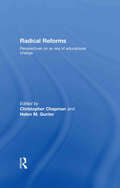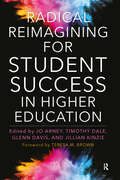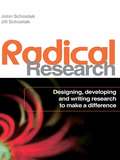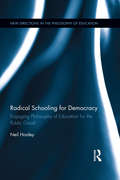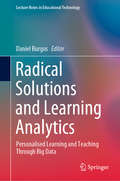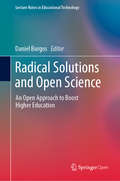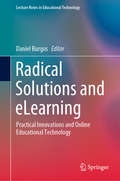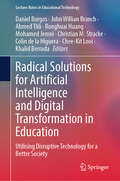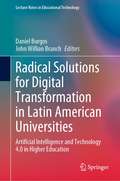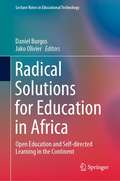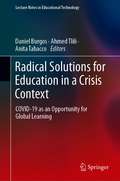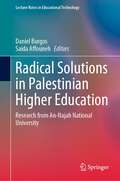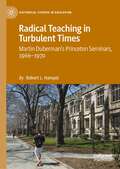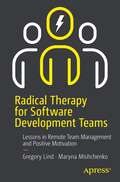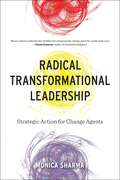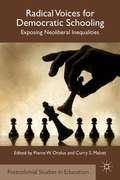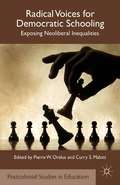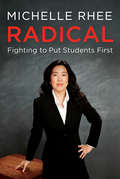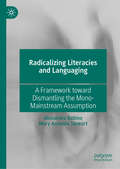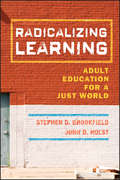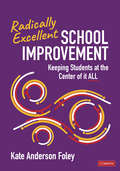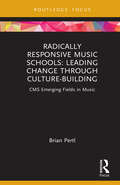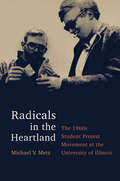- Table View
- List View
Radical Reform in Irish Schools, 1900-1922: The 'New Education' Turn
by Tom O'Donoghue Teresa O'DohertyThis book examines the radical reform that occurred during the final two decades of British rule in Ireland when William Starkie (1860–1920) presided as Resident Commissioner for the Board. Following the lead of industrialized nations, Irish members of parliament sought to encourage the establishment of a state-funded school system during the early nineteenth century. The year 1831 saw the creation of the Irish National School System. Central to its workings was the National Board of Education which had the responsibility for distributing government funds to aid in the building of schools, the payment of inspectors and teachers, the publication of textbooks, and the cost of teacher training. In the midst of radical political and cultural change within Ireland, visionaries and leaders like Starkie filled an indispensable role in Irish education. They oversaw the introduction of a radical child-centered primary school curriculum, often referred to as the ‘new education’. Filling a gap in Irish history, this book provides a much needed overview of the changes that occurred in primary education during the 22 years leading up to Ireland’s independence.
Radical Reforms: Perspectives on an era of educational change
by Helen M. Gunter Christopher ChapmanThis book draws on the lessons from one of the most intensive periods of educational reform in any country during recent times. The post-1997 English experience, under a New Labour government, is used to illustrate the opportunities and challenges associated with attempting to develop a world class education system. Such reforms are fiercely contested - and often polarized - with proponents stressing the opportunities created, while others reveal the erosion of professional values. Contributions from UK and overseas researchers, including Andy Hargreaves and John Smyth, reflect on the implications for those concerned with developing education systems across the globe. Focusing on the challenges of radical reform in key areas - including variation in educational achievement; accountability and standards; linking school and community policies; workforce reform and choice and diversity - the book includes chapters on: Accountability for School ImprovementWorkforce-modelling and Distributed LeadershipMulti-agency Work and Children’s Services The Education and Poverty Link Personalised Learning Initial Teacher EducationDrawing on the framework developed by New Labour to assess the approaches to and outcomes of interventions and the extent to which policies can deliver promised transformations - but going much deeper and wider than this - the authors present a critical account of reform by studying examples of policies, and conceptualizing the interplay between policy, practice and research. With contributions from leading international commentators, this book will be of interest to researchers in education, education policy and school leadership.
Radical Reimagining for Student Success in Higher Education
by Jo Arney, Timothy Dale, Glenn Davis, Jillian Kinzie, Teresa M. BrownCo-published with the Association for State Colleges and Universities (AASCU), which sponsored the project from which the book emerged.This book answers the question “What would your institution look like if students really mattered?” The authors argue that really putting student success at the center of attention will require a radical reimagining of higher education. Much of what is presented here is grounded in the findings of the American Association of State Colleges and Universities’ (AASCU’s) Re-Imagining the First Year (RFY) initiative, which brought together 44 member institutions over a three-year period to identify and test programs, strategies, and tools aimed at improving retention rates for first-year students. The book makes a provocative set of arguments about what is possible if campuses radically reimagine their culture, practices, structures, and rules with the primary purpose of helping students succeed in college and beyond.
Radical Research: Designing, Developing and Writing Research to Make a Difference
by John Schostak Jill SchostakRadical Research explores the view that research is not a neutral tool to be employed without bias in the search for truth. Rather the radical roots of research are to be seen in the focus on freedom and emancipation from blind allegiance to tradition, ‘common sense’, religion, or powerful individuals and organisations. Radical Research introduces and draws upon leading contemporary debates and data gathered from a diversity of funded projects in; health, education, police training, youth and community, schools, business, and the use of information technology. This book presents a radical view of research in a way that enables both beginner and the experienced professional researcher to explore its approaches in the formation of their own views and practices. It progressively leads the reader from discussions of case studies to critical explorations of the philosophical and methodological concepts, theories and arguments that are central to contemporary debates. In essence, this book shows how to design, develop and write radical research under conditions where ‘normal’ research rules apply and it offers a ground-breaking and proven alternative to traditional research techniques.
Radical Schooling for Democracy: Engaging Philosophy of Education for the Public Good (New Directions in the Philosophy of Education)
by Neil HooleyRadical Schooling for Democracy proposes that formal education around the world has a serious philosophical weakness: as the ideology of neoliberalism increasingly dominates economic and as a consequence, educational and social life, formal education has adopted a narrow, rational and economic purpose for all students. Hooley argues that, under these circumstances, schooling is inherently frustrating and alienating for vast numbers of children as they are systematically removed from the big ideas and practices of history and knowledge of which they and their communities are a part and are instead inducted into a technical and superficial rationality of human existence. Radical Schooling for Democracy begins with a progressive and contemporary overview of philosophical and sociological thought during the European Enlightenment and identifies a framework of understanding that is extremely weak in education. This action framework of integrated philosophy, sociology and epistemology generates an ‘action theory’ that not only accounts for human progress, but has the potential to radically change the nature of schooling. A number of theorists who generally support a ‘theory of action’ is considered, ranging from Aristotle, Marx, Dewey and Freire to Habermas. From this analysis, the curriculum, pedagogical, assessment and research constructs of schooling are detailed such that a coherent and integrated model of education as an attribute of being human can be articulated, rather than being seen as a disparate derivative from other disciplines. With its coverage of internationally relevant issues, this book will be essential reading for academics, graduate students, policymakers and researchers in education, philosophy, sociology and epistemology, as well as teachers and pre-service teachers.
Radical Solutions and Learning Analytics: Personalised Learning and Teaching Through Big Data (Lecture Notes in Educational Technology)
by Daniel BurgosLearning Analytics become the key for Personalised Learning and Teaching thanks to the storage, categorisation and smart retrieval of Big Data. Thousands of user data can be tracked online via Learning Management Systems, instant messaging channels, social networks and other ways of communication. Always with the explicit authorisation from the end user, being a student, a teacher, a manager or a persona in a different role, an instructional designer can design a way to produce a practical dashboard that helps him improve that very user’s performance, interaction, motivation or just grading. This book provides a thorough approach on how education, as such, from teaching to learning through management, is improved by a smart analysis of available data, making visible and useful behaviours, predictions and patterns that are hinder to the regular eye without the process of massive data.
Radical Solutions and Open Science: An Open Approach to Boost Higher Education (Lecture Notes in Educational Technology)
by Daniel BurgosThis open access book presents how Open Science is a powerful tool to boost Higher Education. The book introduces the reader into Open Access, Open Technology, Open Data, Open Research results, Open Licensing, Open Accreditation, Open Certification, Open Policy and, of course, Open Educational Resources. It brings all these key topics from major players in the field; experts that present the current state of the art and the forthcoming steps towards a useful and effective implementation. This book presents radical, transgenic solutions for recurrent and long-standing problems in Higher Education. Every chapter presents a clear view and a related solution to make Higher Education progress and implement tools and strategies to improve the user’s performance and learning experience. This book is part of a trilogy with companion volumes on Radical Solutions & Learning Analytics and Radical Solutions & eLearning.
Radical Solutions and eLearning: Practical Innovations and Online Educational Technology (Lecture Notes in Educational Technology)
by Daniel BurgosEducational Technology is the right couple to a radical innovation. Thanks to the appropriate technology in the right context with the best fit to the target audience, education can be drastically improved, meaning a better performance, competence achievement, match with the user’s expectations and with the market needs. Serious games, Virtual reality, Augmented reality, Remote labs, Online learning, Blockchain, Mobile learning and many other key technologies allow for a better explanation of so many subjects, and even more: for a complete student involvement and a full teacher engagement into the educational system. Technology gives another angle to the same content, provides the user with a personalised experience and pushes the limits of knowledge a little further, every time. This book presents a number of radical innovations through technology, from experienced cases studies, to be replicated and inspired by; a powerful resource handbook for cutting-edge education.
Radical Solutions for Artificial Intelligence and Digital Transformation in Education: Utilising Disruptive Technology for a Better Society (Lecture Notes in Educational Technology)
by Chee-Kit Looi Ronghuai Huang Mohamed Jemni Daniel Burgos Ahmed Tlili Christian M. Stracke John Willian Branch Khalid Berrada Colin de la HigueraThis book facilitates understanding of how artificial intelligence (AI) aids and integrates digital transformation (DT) in education institutions worldwide in various scenarios: learning environments (learning innovation, learning management systems, data and analytics), emerging education trends (business trends, strategic technologies), administrative systems (recruit, retain, advance, enterprise business capabilities, student information systems), and digital strategy execution (business models and opportunities, strategic planning and governance). It serves as a reference for university lecturers, schoolteachers, policymakers, and international organizations, who will find in its various chapters practical recommendations and discoveries from practice, ready to be implemented in their contexts. Chapters 1, 2, 7 and 9 are available open access under a Creative Commons Attribution 4.0 International License via link.springer.com.
Radical Solutions for Digital Transformation in Latin American Universities: Artificial Intelligence and Technology 4.0 in Higher Education (Lecture Notes in Educational Technology)
by Daniel Burgos John Willian BranchThis book presents how Digital Transformation is a requirement to upgrade Latin American universities to a next level in management, lecturing and learning processes and strategies. The book starts with a thorough introduction of the Latin American context addressing the three main topics in the book: Digital Transformation, Higher Education and Artificial Intelligence & Industry 4.0. They will be depicted by region, with a clear distribution between Central America & Mexico, Comunidad Andina (Perú, Colombia, Chile, Ecuador, Bolivia), Mercosur (Argentina, Brasil, Paraguay and Uruguay), and other countries. The book also shows how online learning is a key part of the transformation, with a clear focus on learning management systems, innovation and learning analytics. Further, personalised services for every single profile at the university (students, lecturers, academic managers) are presented to guarantee inclusive education service aggregation for networked campuses. Following, the book addresses strategy and overall services that concentrate on sustainability and revenue models integrated with a strategic planning. Finally a set of chapters will show specific experiences and case studies of direct application of Artificial Intelligence and Technology 4.0, where the readers can learn from and transfer directly into their educational contexts.
Radical Solutions for Education in Africa: Open Education and Self-directed Learning in the Continent (Lecture Notes in Educational Technology)
by Daniel Burgos Jako OlivierThis book explores the state of open education in terms of self-directed learning on the African continent. Through a combination of conceptual, systematic literature review and empirical chapters, readers will get a research-based impression of these aspects in this area. Apart from presenting existing wider trends regarding open education, this book also reports on effective open practices in support of self-directed learning.
Radical Solutions for Education in a Crisis Context: COVID-19 as an Opportunity for Global Learning (Lecture Notes in Educational Technology)
by Anita Tabacco Daniel Burgos Ahmed TliliThis book presents how to keep working on education in contexts of crisis, such as emergencies, zones of conflict, wars and health pandemics such as COVID-19. Specifically, this work shows a number of strategies to support global learning and teaching in online settings. Particularly, it first presents how to facilitate knowledge sharing and raising awareness about a specific crisis, to increase people’s safety, including educators and learners. The book then discusses various techniques, mechanisms and services that could be implemented to provide effective learning support for learners, especially in learning environments that they do not daily use, such as physical classrooms. Further, the work presents how to teach and support online educators, no matter if they are school teachers, university lecturers, youth social workers, vocational training facilitators or of any other kind. Finally, it describes worldwide case studies that have applied practical steps to keep education running during a crisis.This book provides readers with insights and guidelines on how to maintain learning undisrupted during contexts of crisis. It also provides basic and practical recommendations to the various stakeholders in educational contexts (students, content providers, technology services, policy makers, school teachers, university lecturers, academic managers, and others) about flexible, personalised and effective education in the context of crisis.
Radical Solutions in Palestinian Higher Education: Research from An-Najah National University (Lecture Notes in Educational Technology)
by Daniel Burgos Saida AffounehThis book brings together education research and practice carried out by An-Najah National University, a lead Higher Institution in Palestine that managed to move from a face-to-face setting to a fully online learning and teaching environment during the initial COVID-19 outbreak, within a month, seamlessly, which makes a success cases study of virtualization. This book concentrates on approaches to ensure the continuous improvement and quality of higher education provision across the country, with particular focus on: a) learning and teaching methodologies in online settings; b) use of open education as a key resource; and c) development of academic capability building, along with academic and knowledge exchange with other higher education partners. Innovative ideas, best practices, and comparative case studies are presented, discussed, and compared with international ones to make specific recommendations for a successful and sustainable implementation.
Radical Teaching in Turbulent Times: Martin Duberman’s Princeton Seminars, 1966–1970 (Historical Studies in Education)
by Robert L. HampelFrom 1966 to 1970, historian Martin Duberman transformed his undergraduate Princeton seminar on American radicalism. This book looks closely at the seminar, drawing on interviews with former students and colleagues, conversations with Duberman, and abundant archival material in the Princeton archives and the Duberman Papers. The array of evidence makes the book a primer on how historians gather and interpret evidence while at the same time shining light on the tumultuous late 1960s in American higher education. This book will become a tool for teaching, inspiring educators to rethink the ways in which history is taught and teaching students how to reason historically through sources.
Radical Therapy for Software Development Teams: Lessons in Remote Team Management and Positive Motivation
by Gregory Lind Maryna MishchenkoBuild and maintain effective, collaborative, and motivated software development teams. This book addresses the challenges in doing so, like communication gaps, trust issues, and motivation problems, and provides strategies to overcome them. You'll be introduced to the Radical Therapy Dev philosophy, a holistic approach designed to optimize software development teams for better performance and overall well-being. This book highlights common pain points in software development and offers solutions to resolving much of the issues in teams. It offers strategies for implementation, focusing on adaptability and accountability, while also promoting community-supported standards. And, the book reveals why an emphasis on fostering a growth mindset, mentorship programs, and junior-intern initiatives promotes continuous learning and collaboration.With the rise of remote work, you'll see why hiring globally while thinking locally is gaining popularity. You'll also gain insights into removing barriers to remote work, along with tools and policies for remote collaboration. Additionally, the book explores the concept of cloud-native software development and its benefits. Radical Therapy for Software Development Teams critiques the traditional "agile" methodology, identifying its shortcomings while extracting valuable lessons that can still be applied effectively. What You Will LearnAddress communication gaps, foster trust, and nurture a growth mindset among team membersAvoid common feedback mistakes, recognize accomplishments, and implement a reward systemImprove software development practices and team dynamics Take a scientific approach to project management rather than traditional requirements gatheringBreak Down Communication BarriersWho This Book is ForSoftware development professionals
Radical Transformational Leadership: Strategic Action for Change Agents
by Monica SharmaMonica Sharma describes how we can source our inner capacities and wisdom to manifest change that embodies universal values such as dignity, compassion, fairness, and courage. Drawing on more than twenty years of work for the United Nations and elsewhere, she presents a radical new approach to transformational leadership, one that creates systems of change where everyone can engage—not just analysts and policy-makers. Demonstrating that we all can be architects of a new humanity, Monica demystifies policy-making, planning, and implementation so that everyone can play an informed and strategic part in eradicating the world’s most intractable problems. Using real-life examples from around the world, she shows how our innate characteristics of universal compassion, equity impulse, and human capability can create new patterns that effectively address major challenges such as gross inequality, unbridled hate, conflicts based on social identity, and the never-enough mindset of greed. Written in a straightforward, accessible style, Radical Transformational Leadership outlines a path-breaking paradigm shift that is already generating equitable and sustainable results across the globe.
Radical Voices for Democratic Schooling: Exposing Neoliberal Inequalities (Postcolonial Studies In Education)
by Pierre W. Orelus Curry S. MalottComprised of in-depth interviews and conversations with key figures in education and activism that thoroughly examine the intersection of neoliberalism, neocolonialism, and racism, this first-rate collection critically explores, through their teaching, various, important issues situated in the context of Western neoliberalism and neocolonialism.
Radical Voices for Democratic Schooling: Exposing Neoliberal Inequalities (Postcolonial Studies in Education)
by P. Orelus C. MalottComprised of in-depth interviews and conversations with key figures in education and activism that thoroughly examine the intersection of neoliberalism, neocolonialism, and racism, this first-rate collection critically explores, through their teaching, various, important issues situated in the context of Western neoliberalism and neocolonialism.
Radical: Fighting to Put Students First
by Michelle RheeIn Radical, Michelle Rhee, a fearless and pioneering advocate for education reform, draws on her own life story and delivers her plan for better American schools.Rhee’s goal is to ensure that laws, leaders, and policies are making students—not adults—our top priority, and she outlines concrete steps that will put us on a dramatically different course. Informing her critique are her extraordinary experiences in education: her years of teaching in inner-city Baltimore; her turbulent tenure as chancellor of the Washington, DC public schools; and her current role as CEO of the education nonprofit StudentsFirst. Rhee draws on dozens of compelling examples from schools she’s worked in and studied, from students who’ve left behind unspeakable home lives and thrived in the classroom to teachers whose groundbreaking methods have produced unprecedented leaps in student achievement.An incisive and intensely personal call-to-arms, Michelle Rhee’s Radical is required reading for anyone who seeks a guide to not only the improvement of our schools, but also a brighter future for America’s children.
Radicalizing Literacies and Languaging: A Framework toward Dismantling the Mono-Mainstream Assumption
by Mary Amanda Stewart Alexandra BabinoThis book names and confounds the mono-mainstream assumption that invisibly frames much research, the ideologies that normalize monolingualism, monoculturalism, monoliteracy, mononationalism, and/or monomodal ways of knowing. In its place, the authors propose multi- and trans- lenses of these phenomena steeped in a raciolinguistic perspective on Bourdieu’s reflexive sociology to move toward a more accurate, multidimensional view of racialized peoples’ literacy and language practices. To achieve this, they first engage in a comprehensive review of literacies, languaging, and a critical sociocultural framework. Then, the distinct testimonios of four women underscore this framework in practice, followed by action steps for research, policy, and pedagogy. This book will be of particular interest to literacy and language education researchers.
Radicalizing Learning
by Stephen D. Brookfield John D. HolstRadicalizing Learning calls for a total rethinking of what the field of adult education stands for and how adult educators should assess their effectiveness. Arguing that major changes in society are needed to create a more just world, the authors set out to show how educators can help learners envision and enact this radical transformation.Specifically, the book explores the areas of adult learning, training, teaching, facilitation, program development, and research. Each chapter provides a guide to the different paradigms and perspectives that prevail across the field of theory and practice. The authors then tie all of the themes into how adult learning for participatory democracy works in a diverse society.
Radically Excellent School Improvement: Keeping Students at the Center of It All
by Kate Anderson FoleySix Steps to Improving Outcomes for Every Student When gaps keep ambitious instruction and engaging learning experiences out of reach of every student, including students with disabilities, those learning English, and others who tend to be left out of school improvement plans, it′s time for radical excellence! Radically Excellent School Improvement presents a model for ambitious improvement and tireless focus that ensures every student grows, thrives, and achieves to their fullest potential. It provides district and school leaders with a bold blueprint for designing, implementing, and monitoring a comprehensive school improvement process for radical excellence. Inside, you′ll find: A six-step school improvement process that ensures all students have access to high-quality instruction Ways for districts and schools to ensure they meet legal and ethical standards Figures, examples, case studies, end-of-chapter summaries, and appendices Written by a transformational leader with years of experience leading districts and states toward equitable, integrated, and inclusive services for all, this resource is a must-read for education leaders who aspire to create a learning environment focused on providing every student the opportunity to achieve.
Radically Excellent School Improvement: Keeping Students at the Center of It All
by Kate Anderson FoleySix Steps to Improving Outcomes for Every Student When gaps keep ambitious instruction and engaging learning experiences out of reach of every student, including students with disabilities, those learning English, and others who tend to be left out of school improvement plans, it′s time for radical excellence! Radically Excellent School Improvement presents a model for ambitious improvement and tireless focus that ensures every student grows, thrives, and achieves to their fullest potential. It provides district and school leaders with a bold blueprint for designing, implementing, and monitoring a comprehensive school improvement process for radical excellence. Inside, you′ll find: A six-step school improvement process that ensures all students have access to high-quality instruction Ways for districts and schools to ensure they meet legal and ethical standards Figures, examples, case studies, end-of-chapter summaries, and appendices Written by a transformational leader with years of experience leading districts and states toward equitable, integrated, and inclusive services for all, this resource is a must-read for education leaders who aspire to create a learning environment focused on providing every student the opportunity to achieve.
Radically Responsive Music Schools: Leading Change through Culture-Building (CMS Emerging Fields in Music)
by Brian PertlRadically Responsive Music Schools is a philosophical reimagining of music higher education culture from the ground up, arguing that holistic cultural change is the key factor needed for music schools to prepare 21st-century graduates for contemporary challenges.The author discusses how university and conservatory music programs can incorporate traits they seek to foster in their students – creativity, innovation, improvisation, and entrepreneurial thinking – into the institutions themselves. Through Deep Listening exercises, thought experiments, and other activities, Pertl provides detailed scaffolding for creating music school cultures of belonging and collaboration, wellbeing and intention, curiosity and wonder, creativity and improvisation, and playfulness and joy. Unpacking the complexities of transforming institutional culture, this book envisions the modern school of music as agile, collaborative, and socially aware and outlines pathways for leaders to realize this vision.Radically Responsive Music Schools is an essential resource for college-level music education administrators, professors, students, or staff members interested in how institutional culture can act as a catalyst for radical change in music programs.
Radicals in the Heartland: The 1960s Student Protest Movement at the University of Illinois
by Michael V. MetzIn 1969, the campus tumult that defined the Sixties reached a flash point at the University of Illinois. Out-of-town radicals preached armed revolution. Students took to the streets and fought police and National Guardsmen. Firebombs were planted in lecture halls while explosions rocked a federal building on one side of town and a recruiting office on the other. Across the state, the powers-that-be expressed shock that such events could take place at Illinois's esteemed, conservative, flagship university--how could it happen here, of all places? Positioning the events in the context of their time, Michael V. Metz delves into the lives and actions of activists at the center of the drama. A participant himself, Metz draws on interviews, archives, and newspaper records to show a movement born in demands for free speech, inspired by a movement for civil rights, and driven to the edge by a seemingly never-ending war. If the sudden burst of irrational violence baffled parents, administrators, and legislators, it seemed inevitable to students after years of official intransigence and disregard. Metz portrays campus protesters not as angry, militant extremists but as youthful citizens deeply engaged with grave moral issues, embodying the idealism, naiveté, and courage of a minority of a generation.
